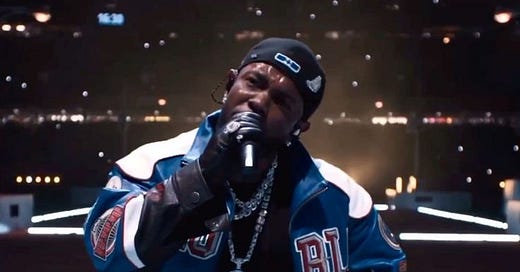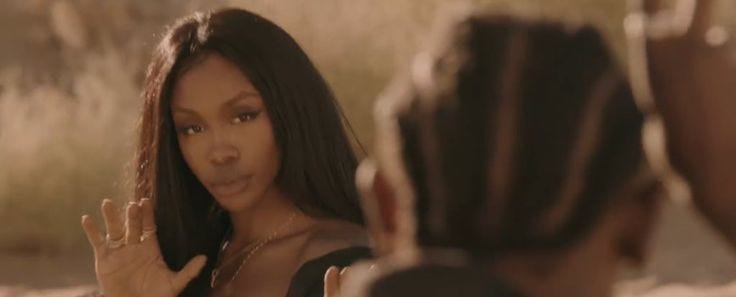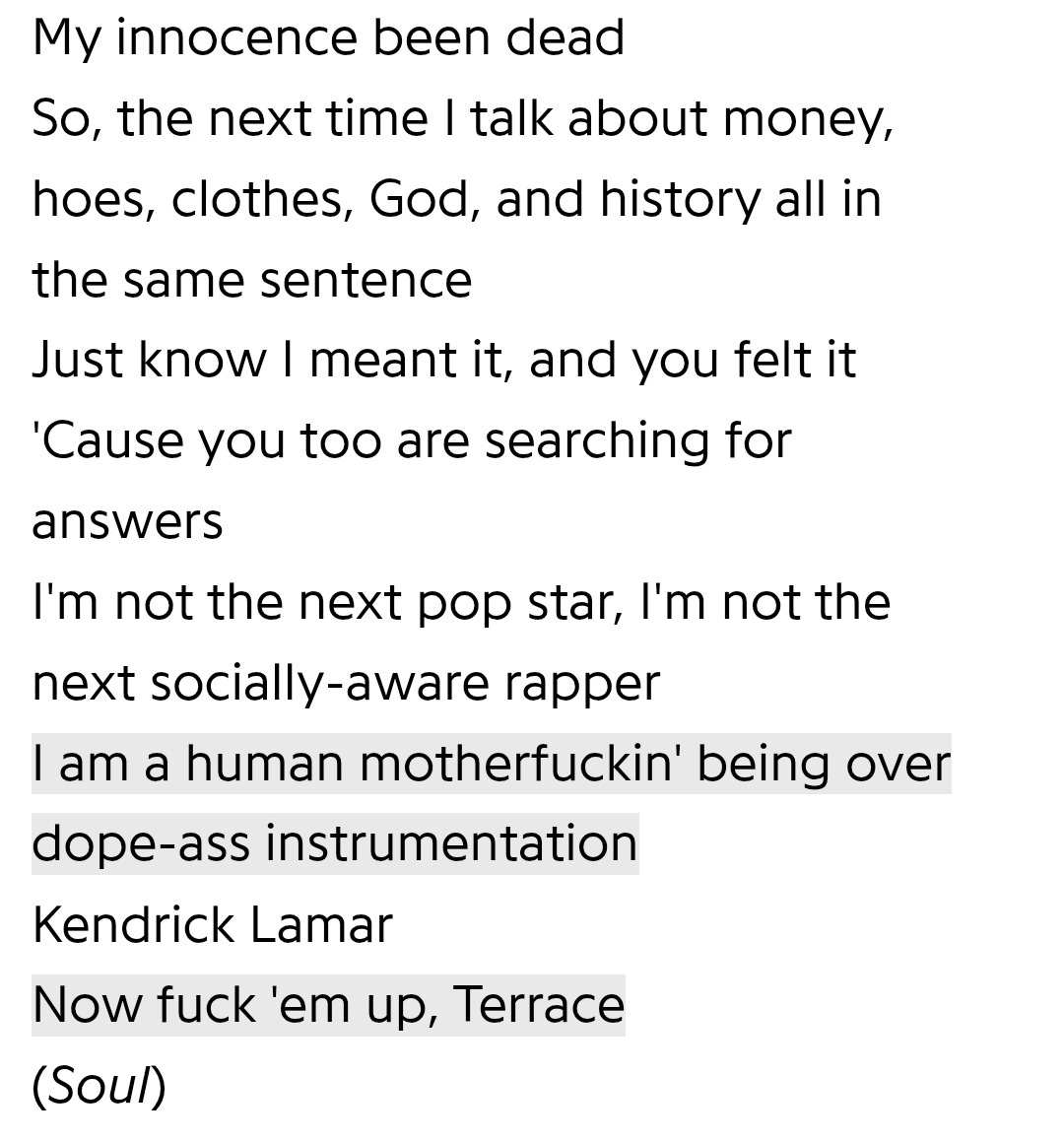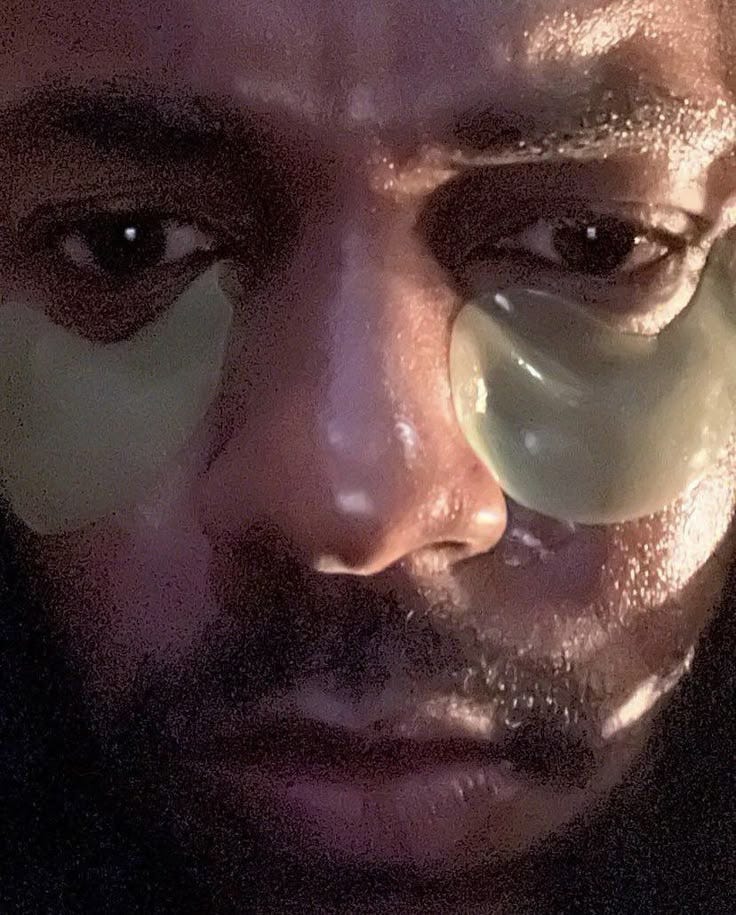intro (i’m late to the party).
“Fuck being rational, give ‘em what they ask for.”
Alright so boom. A lot of reflection and additional exploration took place since the week that I began this essay, and now my original words feel stale like soda crackers that have been left in the tin for too long. It’d feel weird if I just published it without adding anything or doing any sort of retrospective. Fuck it, let’s do a two-parter.
(I promise that I will actually follow up with the second half of…whatever this is.)
So, I started out only really being “into” Kendrick for the moment because I found it deeply hilarious that Drake thought it was a good idea to get into a rap battle of any kind with him. Like most people, I took immense pleasure in watching that guy get lyrically curb-stomped in front of the entire world while getting some new music to shake ass to out of it. “After this,” I thought, “I’ll move on and leave this nigga alone. Put him back where he was on the shelf.”
Unfortunately, my neurodivergent-ass brain doesn’t work like that. Even worse: Kendrick then decided to release an album containing a song in which he plays the role of Lucifer (of Bible fame), reinterpreting the figure to have been reincarnated in the form of various influential black artists, the cycle landing eventually on Lamar himself. Then came the Super Bowl half-time performance that, despite its seemingly surface-level messaging, I am still thinking about weeks later.
Look, I didn’t really grow up listening to contemporary rap. I wasn’t even allowed to use social media until I turned thirteen. Maybe this is not so extreme to you if you’re a little older than me, but for my generation this puts you at least a decade behind everyone else culturally. I was always out of the loop whenever this or that artist dropped a new track that all my classmates seemed to know by heart come Monday morning at school. It wasn’t till high school that I even became aware of Kendrick Lamar’s music at all.
I didn’t do an album deep-dive or anything (I couldn’t buy CDs with my own money nor did I have access to paid streaming services that played your stuff in order), but I liked the popular shit. Y’know, Humble and DNA. I boxed him in mentally as “one of the good rappers that actually say stuff that makes you think”, and moved on with my life. It helped that he liked to collaborate with SZA, one of my new favorites at the time and the one R&B artist I could connect with my peers over.
Last week I speed-ran the majority of his discography: Section.80, good kid, m.A.A.d city, untitled, DAMN, and finally, Mr. Morale and the Big Steppers (I’d already listened to To Pimp a Butterfly the previous year). Before all this, I was already aware that he was an incredibly skilled lyricist with insane production on his side. I knew, broadly, that he had some cool visuals that Symbolized Things. But…my god. I really was not familiar with his game and I hate saying that because now I sound like a fangirl! I’m too old for that shit!
But like…the man is fascinating to me. He’s weird about cereal. He’s honest in his music in a way that feels consistent. Yeah he says and does hypocritical shit, but the hypocrisy feels messy and human. I told my friends that he’s like your hotep uncle that’s marginally more socially conscious than the rest of your family but says odd shit like “grand rising”. He’s funny though, and less homophobic than your parents. It’s not as much of a pain in the ass to explain the concept of pronouns to him, so you stick around. Talk to him at family gatherings.
Kendrick’s also got a weird tendency to predict with near-perfect accuracy the trajectory of his career in his work. My mom’s like that—she has dreams about things after she prays and they tend to happen. Maybe he’s got some weird spiritual shit going on, maybe he has a brain like mine that’s just really good at recognizing patterns in a way that fools others into thinking you’re having a moment of pure genius when you’re not. Who knows? Astrology girlies, please feel free to offer your input.
I could do a surgical critique on all the parts of his work that fall flat (like the patronizing manner in which he talks about women, reducing them to symbols and cautionary tales), but it would feel quite overdone. I’ll probably only do a little bit of that, I think. Harmony Holiday did it better than I could, anyway. I don’t think in-depth musical critique is my thing, but it for damn sure is hers.
BUT! Because I don’t like hiding things, here’s the original introduction to my first draft:
Anyone else tired of niggas acting like symbolic wins mean literally anything right now?
Look, I had fun watching the half-time performance. I got up to watch it live as soon as I heard it starting. Only thing was I didn’t have my glasses on, so I missed a lot of minute details because the TV was blurry as shit. I didn’t even realize that it was Serena Williams crip-walking in front of me until my parents pointed it out, and the cameo made me laugh.
But it was no revolution. Of course not. Not the revolution some folks are thinking of, at least.
In my last Kenny-centric post, I said:
“Kendrick, though I have my many critiques of him, has inadvertently brought a lot of questions about blackness and pop culture back to the front of my mind. What does it mean, to be perpetually observed? To be constantly putting on a show that you didn't sign up for?”
Now, in this case, Kendrick very much did sign up to participate in the spectacle. The political commentary does not change the reality of said spectacle nor does it change what it’s in service to. Subvert and break up the American flag all you want, you are still clothed in it. It’s hard to keep waving it around as a bit when the sight of it signifies death for…well, most people. If we agree that art should reflect the times, then I'd argue that this particular art feels more like it belongs in the post-Obama, post-Hamilton “this is not who we are” ass landscape of the late 2010s. Not 2025, as we watch missiles and state-backed militias tear people’s lives apart in real time from our devices, unmediated by any sort of poetic symbolism or sugar-coated journalism.
Though, I do think that the “should Black artists use the American flag” discourse has been worn out, dissected, and turned every which way. I’m frankly tired of it. There’s not much else to say that hasn’t already been said. The unfortunate reality is that the U.S. flag is likely going to experience plenty more attempted resuscitations until its final breaths. What does still interest me, however, is why Kendrick’s approach seemed to resonate more than that of Beyonce. I suspect that some (not all) of it is a combination of misogynoir and the public perception of Ms. Knowles as being more explicitly aligned with “the establishment” so to speak than a self-proclaimed disruptor like Kendrick. Obviously there are many valid critiques to be made of the effectiveness of Cowboy Carter as a project, but I would be remiss to act like all of them are made in good faith. Whether you prefer Kendrick or Beyonce’s performance is honestly up to you, though—my purposes here aren’t really to debate that.
Even though I definitely couldn’t see the entire performance clearly, I heard quite a few lyric changes and additions that made my ears perk up. If we’re gonna talk symbolism and imagery, then let’s break some down, yeah?
…And I’m still gonna do that, but not in the way I had planned.
the great american game.
First of all, Kendrick’s already done this before.
In 2016, a parallel timeline to this one, he began his performance of Alright standing on the roof of a car—a heavily-vandalized police car, not a black Grand National Buick—surrounded by dancers dressed in black that bring to mind images of protesters in the aftermath of rallies against state violence (I don’t like saying ‘police brutality’ because it implies that violence against black people is some unique disease or sin committed only by the worst of those in uniform). A large American flag billows across from him, torn at the ends. If I had watched the BET Awards in 2016 (I would’ve been around 13), this would’ve felt like some brave act of iconoclasm. In 2025, it now reads as more of a broken promise. A brief period of mourning before we return to our regularly-scheduled programming.
The dancers march around him (sound familiar?), step off the stage to dance amongst the crowd, the whole shebang. Even the circle on the ground that Kendrick stands in the middle of feels like a smaller-scale version of what’s to come almost ten years in the future. The dancers lie on the ground in a moment of pause, right on-beat, as if dead. But then they convulse, and eventually rise to continue dancing, revived. By what? Kendrick’s reassurance that “we gon’ be alright” speaking life back into them? Maybe.
The last part is interesting: near the end of the performance, the dancers wave around smaller American flags of their own, all of which are perfectly intact. What a baffling choice; is it reclamation or mockery? Satire, or attempted resuscitation as I mentioned earlier?
Kendrick’s 2025 performance feels less out-of-the-blue now that I’ve seen this and gotten familiar with his work, and one thing that I know for sure is that he likes to play the long game. His albums feel like one long, winding character arc when you play them in order—why wouldn’t he do the same live?
Welcome to the Super Bowl.
The dancers and the torn flag are no longer separate entities, now one and the same. There’s a metaphor in there somewhere. The flag-people are divided by Kendrick’s own physical body and they march forward militantly as he tells…someone (America? Or is he parroting what America tells us to be?) to “Sit down, be humble”. Then the dancers scatter. In both versions of this story, the flag is in tatters.
This would’ve been the part where I go on to dissect every single moment and song choice going forth, analyzing the symbolism and what it means in relation to our current socio-political landscape.
But do you really need that from me?
There’s already a million different ways that every detail could’ve been interpreted (for example, Kendrick’s choice to perform All the Stars, in which he says that he doesn’t want anyone’s congratulations and doesn’t even like the entities endorsing him. At the Super Bowl). But I think that in our rush to interpret his political messaging and hyper-focus on his beef with the Canadian man, many have forgotten that Kendrick’s entire body of work is neither wholly political commentary nor 100% bold proclamations about being the best of the best. He is also telling us a story about himself.






